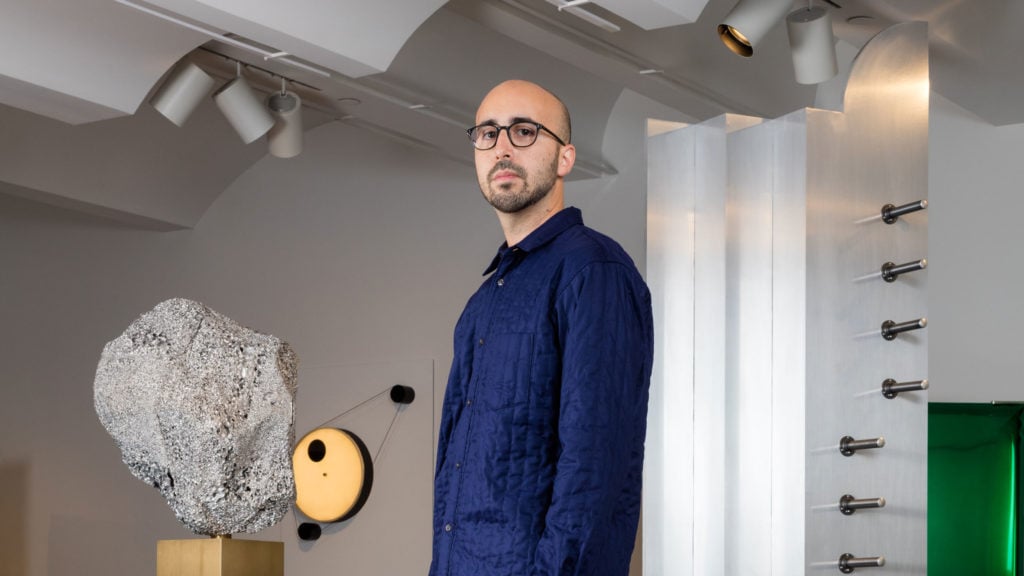Politics
New York Gallery Owner Denied Entry Into US From Argentina
Juan Garcia Mosqueda, a legal US resident, was detained for 36 hours before being forced to fly back to Buenos Aires.

Juan Garcia Mosqueda, a legal US resident, was detained for 36 hours before being forced to fly back to Buenos Aires.

Alyssa Buffenstein

Juan Garcia Mosqueda, owner of the Chelsea design gallery Chamber NYC, was inexplicably denied entry to the US on Friday after a trip to his native Argentina, according to an open letter he titled “The Visible Wall” and shared with friends and colleagues yesterday.
Mosqueda, who was sent back to Argentina, explains the “dehumanizing and degrading” experience he was subjected to at the border, including being questioned under oath, denied legal counsel, held without food for 14 hours, prohibited from using any means of communication, and denied privacy when using the bathroom.
His belongings—which he could not access while kept in holding—were searched, and his legal documents were kept from him until he arrived back in Buenos Aires. He was escorted onto the plane by armed officers.
“This thirty-six hour nightmare is nothing but clear evidence of a deeply flawed immigration system in the United States, carried out by an administration that is more interested in expelling people than admitting them,“ he writes.
The curator and gallerist explains he has been a legal resident of the US for ten years, as a student, employee, and proprietor.
“Although I am not an American citizen, Chamber is an American product that I hope adds to the cultural landscape of the country,” he writes.
“The gallery was conceived in alignment with the same idea of inclusion that was found in the streets of the Lower East Side (where I live and was denied access to) not so long ago: a melting pot of all nationalities and religions, importing ideas from abroad to a culturally embracing metropolis.”
He concludes the letter by urging his American friends to push for immigration reform by contacting their congressmen, and inviting those who are in New York to enjoy a glass of wine on his behalf at Chamber’s opening on Thursday, March 2.
This is just one of many cases of non-US citizens, even with proper visas or green cards, being turned away at the US border under Trump’s travel restrictions, which came in the form of an executive order in January, and were subsequently blocked by a federal judge in Washington state.
Mosqueda’s case, however, is, on the surface, particularly baffling. Under the initial order, travelers from seven Muslim-majority countries—Iran, Iraq, Syria, Sudan, Somalia, Libya, and Yemen—were banned from entering the US. A revised version, set to be introduced this week, bans travelers from all the aforementioned except Iraq, as well as the temporary suspension of all foreign refugees. Legal residents of the US should not be barred under the order.
artnet News has reached out to Mosqueda’s gallery for more details on the circumstances of the denied entry, and will update as more information becomes available.
UPDATE: Mosqueda is currently working on re-entering the US, and for that reason is not speaking to the media at this time. A representative from Chamber gallery passed along the following statement by Mosqueda, although both he and the gallery failed to address the reason for his denied entry.
Mosqueda writes, “Since issuing the letter this morning, I have received tremendous support from not only the design community in New York but from people all over the world. I greatly appreciate everyone’s kind words and concern following this unfortunate incident. My reason for sharing my experience was to bring to light the situation currently facing immigrants from around the world and to encourage my American friends to contact your local congressmen and push for immigration reform. I am currently in the process of dealing with my re-entry into the United States and for this reason I am not able to speak with media at this time. Thank you again for your support.”